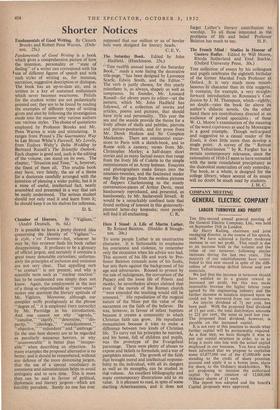Chamber of Horrors. By "Vigilans." (Andre Deutsch. 9s. 6d.) IT
is possible to have a pretty shrewd idea concerning the identity of " Vigilans"— le style, c'est l'homme—but, whoever he may be, this reviewer finds his book rather disappointing. It professes to be a glossary of official jargon, and certainly it contains a great many detestable curiosities; unfortun- ately the principles of inclusion and omission are not very clear. That appalling verb "to contact". is not present; and why a scientific term such as "nuclear reaction" has to be condemned one simply does not know. Again, the employment in the text of a thing so objectionable as "near-sense" makes one question the literary aptitude of Mr. Vigilans. Moreover, although our compiler sniffs prodigiously at the phrase "degree of," it is employed (very correctly) by Mr. Partridge in his introduction. And one cannot see why "agenda," "canalise," "clarify," "determine," "dis- parity," "ideology," "maladjustment," "objective," "redundant" and "umbrage" (in the uses here shown) are to be regarded as peculiarly nauseous horrors, or why "unanswerable" is better than "insuper- able" when describing an objection. In many examples the proposed alternative is no better; and it should be remembered, without any defence of the more distressing jargon, that the use of a special vocabulary in commerce and administration helps to avoid ambiguity and to save time. This is more than can be said in favour of political, diplomatic and literary jargons—which are horribly prevalent. Surely no one has ever supposed that our million or so of bowler hats were designed for literary heads.
C. E. V.


















































 Previous page
Previous page